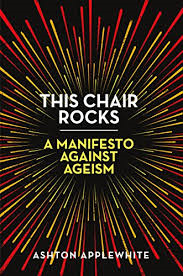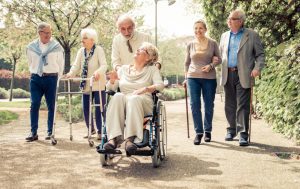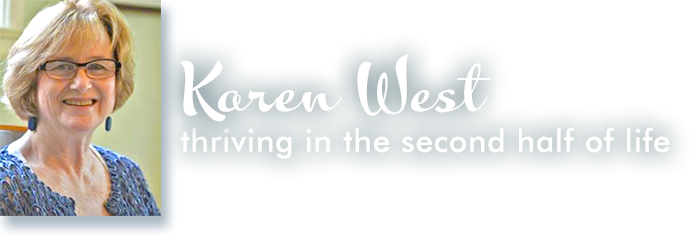(This is my ninth blog entry. I wrote the first four as an introduction to “conscious aging” and “sage-ing,” so if you are new to this topic, I suggest you read my first four entries in order.)
After reading This Chair Rocks: A Manifesto Against Ageism by Ashton Applewhite, I realized how important it is that we “olders” (Applewhite’s term) recognize the prevalence of ageism in our society. And it isn’t just the young who are ageist; older people have internalized the same stereotypes. This is why so many of the students in my classes and workshops are surprised (but intrigued) when I tell them that Wendy Lustbader writes about “the unexpected pleasures of growing older” (the subtitle of her book) or when Applewhite says in her book that “the passage of time confers very real benefits upon us.” (12) Having the opportunity to discover and discuss these “pleasures” and “benefits” is one of the reasons why I am passionate about writing and teaching about “conscious aging” and “sage-ing.”
 When in denial about their age, people often say they “don’t feel old.” Applewhite tells us that when she started her study of ageism, the commonly asked question “How old do you feel?” didn’t seem like a loaded question. She says, “The widespread tendency to knock a few years off your age seemed optimistic at best and harmless at worst. At fifty-five I felt fully engaged, at the height of my intellectual powers, reluctant to trade my bikini for a one-piece with a little skirt, or otherwise trim my sails. In other words, I felt ‘young.’ By the same token, ‘feeling old’ was invariably a complaint, meaning ill or unattractive, maybe a little blue or slow off the mark.” (39)
When in denial about their age, people often say they “don’t feel old.” Applewhite tells us that when she started her study of ageism, the commonly asked question “How old do you feel?” didn’t seem like a loaded question. She says, “The widespread tendency to knock a few years off your age seemed optimistic at best and harmless at worst. At fifty-five I felt fully engaged, at the height of my intellectual powers, reluctant to trade my bikini for a one-piece with a little skirt, or otherwise trim my sails. In other words, I felt ‘young.’ By the same token, ‘feeling old’ was invariably a complaint, meaning ill or unattractive, maybe a little blue or slow off the mark.” (39)
I looked up “old” in a dictionary, and it wasn’t until the fourth definition that the connotation was negative, and this definition didn’t refer to a person. “Worn with age or repeated use; dilapidated; worn-out; shabby; an old suit of clothes.” Old people have a lot more going for them than “an old suit of clothes” does. Applewhite says, “In a youth-obsessed society, people yoke aging to its inevitable end. We project our fears. We grossly underestimate the quality of life that the old enjoy, and often its value to the community as well.” (210) Those in the conscious aging movement are attempting to change this “gross underestimation,” both for themselves and for others.
Applewhite refers to William James, who said it is an” illusion” to think that we can ever know what another person is experiencing, so when we’re younger, we can’t really know how someone older feels about their life. She quotes Dr. Thomas Finucane, who quoted a Mexican saying: “’The appearance of the bull changes when you enter the ring.’ The matador’s point of view is different from the spectator’s. The bull looks different.” (210) “The bull looks different”: a good mantra for older people. How often have you heard someone say, when they have observed an older person struggling, “if I ever get to that point, please put me out of my misery.” I actually had this experience in one of my classes. Someone said they weren’t sure if they wanted to live into their nineties. My three students in their eighties enthusiastically assured him that they were very happy to be alive. As Applewhite says,“There are very few people who want to live to be 100—and most of them are in their late nineties.” (211)

Earlier this summer, my seventeen-year- old grandson worked at Crater Lake National Park for a month, and when I asked him what he did, he said he worked on a mile-long hiking trail for people with walkers and wheelchairs. I didn’t know there was such a thing, but it made me happy. Then I found this picture which really made me smile.
When people insist that I’m not old at 71, I wonder when they will see me as “old.” Perhaps when I’m 86? Applewhite quotes Bernard Baruch, who did a good job of summarizing this dilemma. “He lived to be ninety-five and declared old age to be ‘always fifteen years older than I am.” (41) Seems about right.
One of the reasons that ageism is so bad is that it lumps everyone ranging from “those in their fifties to centenarians” in one group: “old.” As Applewhite says, “Can you imagine thinking the same way about a group of twenty- to sixty-year-olds?” (8) As I’ve said in earlier blog posts, we elders who have had our consciousness raised are learning to embrace the opportunity to be an empowered elder. Together we can show people that being ageist is as ignorant as being racist or sexist.
I hope you will choose to read This Chair Rocks. It will change the way you see aging.
To contact me, please call me at 651–399-9571 or email me at karenw0214@gmail.com I would love to have you take a minute to let me know what you think of my blog.


2 thoughts on ““I don’t feel old””
I like Applewhite’s question: “How do we feel about “old”. It opens up the question of aging to newer and broader possibilities. Personally my response is likely to change–depending on the day, the weather, my arthritis, how well I slept, what I look forward to.
I appreciate the point you and Applewhite make about lumping everyone from “their fifties to centenarians” in one group. On the other hand, I had a surprising experience a couple weeks ago. I drove to Chicago to visit my 99 year young mother. Several people asked if we were sisters. I am 72, i.e., mom has 27 more years of experience. I was surprised the first time. After a couple other people asked the same question‑I began to consider that I must be moving more clearly into the category of elder.
Thank you so much for your comment, Mira. I wonder how many other people have had a similar experience. Unfortunately my mother didn’t live long enough for me to have such an experience. I hope you will continue to read my blog and share your comments!